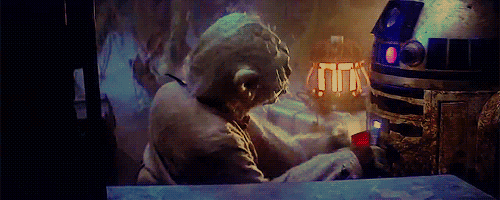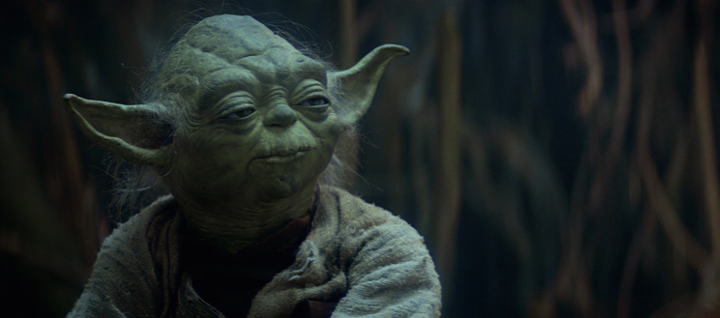Master Yoda, no room for grace has he
My last post was about the Doctor showing grace to someone — offering a Zygon forgiveness she didn't deserve, which changed her completely. Today I want to talk about the exact opposite: a well-known and much-loved character, from Star Wars no less, who has no room for grace in his heart: Yoda.
I don't think I've ever met anyone who didn't like Yoda. He's lovably odd in various ways — the famous mangled syntax, the fact that when we first meet him he spends a surprisingly long time hitting R2-D2 with a stick so he can have Luke's (rather small and ineffective-looking) lamp. Indeed, it's probably only R2-D2 who would beat him in a "most lovable Star Wars character" competition. From the original trilogy anyway, BB-8 has probably won hearts among a new generation coming to Star Wars for the first time.

Mine!
(Image: Lucasfilm)
And generally people agree that Yoda is wise. I know people who, to this day, quote his famous "No! Try not! Do, or do not. There is no 'try'." Before the Empire, Yoda was the Grand Master of the Jedi Council, and Master of the Order, positions awarded to him because of his wisdom. But the least valuable thing he ever says, from a Christian perspective, is a line only a little less famous than "there is no 'try'". And it is this:
If once you start down the dark path, forever will it dominate your destiny, consume you it will, as it did Obi-Wan's apprentice.
— Yoda, The Empire Strikes Back

Yoda: no room for redemption
(Image: Lucasfilm)
There's room for debate even within the Star Wars universe as to whether or not Yoda is actually right. When confronting his father in Return of the Jedi, Luke says "Your thoughts betray you, Father. I feel the good in you, the conflict...You couldn't bring yourself to kill me before and I don't believe you'll destroy me now." And, of course, Vader turns on the Emperor to save Luke at the climax of the film, though given that he dies soon after I suppose one could argue that his change of heart might not have stuck. In the new trilogy, Kylo Ren appears to be "plagued" with the pull of the Light Side, and it wouldn't surprise me to see him switching sides over the course of the next two films.
But regardless of whether the rest of the galaxy agrees with him, the only word I can find to describe Yoda's philosophy of good and evil is "crushing". What a huge burden he's placing on Luke! Alongside teaching him how to use the Force, he's warning Luke that one wrong turn and the Dark Side will consume him, and there's no going back. Yoda at least understands that temptation and giving in to temptation are not the same thing, but he's setting Luke up for a life of looking over his shoulder wondering if the Dark Side will one day overtake him. Yoda's worldview has no room for redemption. He sounds a lot like the teachers of the Law in the gospels that Jesus rebuked:
Jesus replied, "And you experts in the law, woe to you, because you load people down with burdens they can hardly carry, and you yourselves will not lift one finger to help them."
— Luke 11:46
The teachers of the Law, and the Pharisees (who were the Bible's great rule-keepers), were loading up requirements on the Jews of Jesus' day, giving them a hopeless religion of rules that hampered them coming to God as sinners in need of forgiveness rather than people earning his love. Jesus, on the other hand, offers us a relationship with God free from desperate rule-keeping:
"Come to me, all you who are weary and burdened, and I will give you rest. Take my yoke upon you and learn from me, for I am gentle and humble in heart, and you will find rest for your souls. For my yoke is easy and my burden is light."
— Matthew 11:28-30
Here is something very different — a Saviour who knows that we constantly fail to resist the pull of the "Dark Side" (that is, sin), and comes to rescue us anyway. A God who offers to redeem us, the very thing Yoda says is impossible, and accept us not on the basis of our performance, but on the performance of his Son. After rescuing us, of course, God does call us to live his way in obedience to him, but this isn't about us doing enough to stay in God's good books. Jesus has already done everything to rescue us; obedience is about living out our new status as God's children, not maintaining it.
The gospel therefore, unlike Yoda's take on things, is meant to free us from existential dread, being afraid all the time about whether we're "good enough". I've tried existential dread, it's no fun. There was a time I thought I'd saved myself by doing the right things, and I was constantly worried that by messing up I could therefore lose myself. If you've ever met someone raised as a Christian who seems to be carrying around a crushing burden of guilt, this is probably what's gone wrong. They've bought into a religion of "doing good things" that they know they can't keep up with. Realizing for the first time — I can remember it clearly — that Jesus had already done everything that needed to be done for me to be rescued and, crucially, that I couldn't mess that up was like such a burden being lifted off me that I felt like I was going to start floating. Compared to Yoda, or the teachers of the Law, Jesus' yoke is easy, and his burden is light.